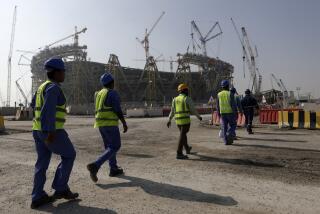Activists Seize Spotlight Trained on the Games
- Share via
ATHENS — They positioned 13 white crosses on the asphalt in front of the cream-colored Greek parliament and chanted loudly about the deaths of construction workers killed while building the massive infrastructure for the Olympic Games starting here Friday.
“The Olympics are built on the blood of the workers!” the protesters cried, as the sun set behind the Acropolis on the horizon.
“The Olympic celebrations cannot hide what has happened,” declared a union leader, Andreas Zazopoulos.
Solemnly, they hung small wreaths on the crosses, one for each of the six Greeks and seven Albanian immigrant workers killed on the job in the Summer Games run-up.
With thousands of journalists and TV cameras eagerly available and the world spotlight focused here, the Olympics serve as an ideal platform for political and social causes. What better venue for airing issues such as freedom for Tibet, returning the Elgin marbles to Greece, and better treatment for garment workers?
And so it was Tuesday, three days before the Games start.
“They told us to wait until after the Games finished to do this, but how can we wait?” asked George Mavrikos, head of the leftist All Workers Militant Front, which organized Tuesday’s protest over the construction deaths.
“We cannot withhold the truth,” he proclaimed over a loudspeaker that echoed through downtown Athens’ central Syntagma Square. “This is the true Greece.”
A few yards away at the elegant Grand Bretagne Hotel, where it is rumored that Britain’s Prince Charles will be staying during the Games, sleek black cars delivered VIP guests and security guards with radio wires in their ears kept watch.
In addition to the 13 men killed while working on hurried construction of Olympic venues during the last two years, more than 200 workers were seriously injured, the activists said.
The official fatality rate -- several union officials said many more actually had died -- is higher than in other Olympic cities in the past, and The Times this year verified the findings of an internal Greek government report that described egregious safety violations. These included workers wearing flip-flops and no hardhats; a lack of safety belts for those working at heights; open pits without protective covering. Many workers were illegal immigrants without proper documents, The Times found.
“He said he was worried about safety, but he never mentioned anything specific,” Anastasia Zotay said Tuesday, speaking about her 23-year-old son, Emilio, who was killed in January while working on a portion of Athens’ Metro system, which was expanded for the Olympic Games.
Zotay, dressed in black, said her son was killed when he fell into an uncovered construction pit. No one from the Greek government or the Olympic committee expressed condolences, she said.
“We worked day and night, under very hard circumstances, to finish on time,” said Eri Zilfo, an Albanian immigrant worker who spoke at the demonstration, which was punctuated by Greek folk songs and raised fists. “And as if that wasn’t enough, there were accidents and people lost their lives. All these [Olympic] celebrations are forgetting the people who worked to make it possible.”
Construction death was not the only subject of protest Tuesday.
Garment workers, who said their counterparts work in slave-labor conditions in Indonesia, Turkey and elsewhere to fill the orders of U.S. sportswear labels, staged their own demonstration.
Atop a central Athens hotel under a searing sun, protesters wearing white masks to symbolize the anonymity of the workers filed into a bank of sewing machines and began to work, the whir of the machines the only sound during the silent demonstration.
Organizers said the purpose of the protest was to attract attention to the entire sportswear industry -- not just the T-shirts marketed at the Games.
“This is the biggest sports event in the world,” said union activist Duncan Pruett, a protest sponsor. “It is completely appropriate for us to be here.”
A 6-month-old campaign has succeeded in persuading some large multinational clothing corporations to insist on better working conditions for those -- mostly women -- who sew their products, the activists said. But the Olympic committee has ignored their pleas, they said.
Protests will continue today, when women speak out against countries that have banned female athletes from their Olympic delegations.
Such countries, the protesters say, should be excluded from the Games the way South Africa was for decades because of their “institutionalized model of segregation.”
More to Read
Go beyond the scoreboard
Get the latest on L.A.'s teams in the daily Sports Report newsletter.
You may occasionally receive promotional content from the Los Angeles Times.








